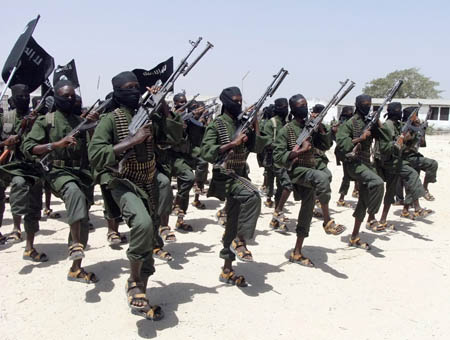
In this Thursday, Feb. 17, 2011 file photo, hundreds of newly trained al-Shabab fighters perform military exercises in the Lafofe area some 18 km south of Mogadishu, in Somalia. International military forces carried out a pre-dawn strike Saturday, Oct. 5, 2013 against foreign fighters in the same southern Somalia village where U.S. Navy SEALS four years ago killed a most-wanted al-Qaida operative, officials said. (AP Photo / Farah Abdi Warsameh, File)
MOGADISHU, Somalia (AP) — The al-Shabab stronghold of Barawe, a coastal town in Somalia where U.S. Navy SEALs came ashore in a failed raid last weekend, is gripped by fear and tension as residents worry they’ll be accused of spying and the insurgents ready for another attack.
Foreign fighters and Somali members of al-Shabab have in recent years moved into the town, edged by red desert and emerald seas, as African Union peacekeeping troops and Somali government forces pushed the Islamic insurgent group from Somalia’s capital and other areas.
Saturday’s pre-dawn raid by the American commandoes was aimed at a Kenyan al-Shabab member named as a planner of al-Shabab terrorist attacks. Since the SEAL raid, more al-Shabab battle wagons — pickup trucks mounted with machine guns or recoilless rifles — can be seen prowling the sandy streets of the town, residents say.
Most of the residents of Barawe, a town which has existed for more than five centuries, rely on fishing and small businesses for income. Al-Shabab maintains strict control of the activities and life of local residents who are told to close shops and other businesses to attend the five daily Muslim prayers at mosques. The insurgents also require women to wear Islamic dress that covers the whole body except for the face or eyes.
Residents told The Associated Press by phone that after the SEAL raid on a seaside villa, al-Shabab fighters detained several people on suspicion of spying, an allegation that often leads to public executions without any meaningful judicial process.
“We are really scared. Sounds like they think everyone is spy,” said Noh, a resident who did not want to have his surname used out of fear of reprisals.
Barawe, which lies on Somalia’s southeast coast between Mogadishu and the Kenyan border, has been under the control of al-Shabab since 2009, when Ethiopian troops pulled out of southern and central Somalia. The militants named a mayor of the city, which is a militant training ground and economic hub.
A July report by the U.N. Monitoring Group on Somalia said that al-Shabab has a “suicide training school” near Barawe.
The town hosts the largest number of foreign fighters in Somalia, most often from Kenya, Yemen and Sudan. In September 2012, militants publicly executed two men they accused of spying for African Union forces. In February the bodies of two beheaded men were found, likely killed by militants who suspected them of having links with the government, the U.N. report said.
Barawe’s port is a money-maker for the insurgent group, used by ships bringing in illegal weapons and shipping out charcoal — between 600,000 and 1 million sacks per month, according to a U.N. estimate. Each sack is charged a $2 tax, netting between $1.2 million and $2 million a month for al-Shabab.
Since al-Shabab lost control of the port city of Kismayo, the Barawe income and taxes provide an important economic base for al-Shabab, which provides no social services to residents. The fighters have been able to maintain control of the town and its crumbling, arched buildings because the African Union and Somali government forces are too thinly spread to try to invade.
The Somali government and AMISOM, the acronym of the AU peacekeeping mission whose forces currently number 17,000, have repeatedly asked the U.N. for authorization and funding of more troops and attack helicopters, so far to no avail.
In September 2009 a SEAL raid in Barawe killed six people, including Saleh Ali Saleh Nabhan, one of the most-wanted al-Qaida operatives in the region and an alleged plotter of the 1998 U.S. Embassy bombings in Kenya and Tanzania.
“The latest attack made the mujahedeen even more vigilant,” said Abu Mohamed, an al-Shabab official in Barawe. “Any more attacks by them will strengthen our morale and spirit.”
Saturday’s SEAL raid occurred 20 years after the “Black Hawk Down” battle in Mogadishu in which a mission to capture Somali warlords in the capital went awry after militiamen shot down two U.S. helicopters. Eighteen U.S. soldiers were killed in the battle, which marked the beginning of the end of that U.S. military mission to bring stability to the Horn of Africa nation.
In 1991, warlords overthrew a longtime dictator and turned on each other, plunging Somalia into chaos.